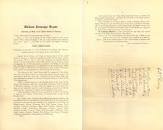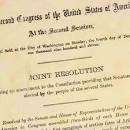There are several momentous events that altered the America envisioned by our Founders.
And not for the better.
A key element of American History is left out of the education provided by government schooling.
Federalism.
The Constitution was ratified by the colonies with the proviso that the concept of 'federalism' would be the basic doctrine of the new nation.
Federalism, "... a system of government in which sovereignty is constitutionally divided between a central governing authority and constituent political units (such as states or provinces).
Federalism is a system based upon democratic rules and institutions in which the power to govern is shared between national and provincial/state governments,..." Federalism - Wikipedia, the free encyclopedia
That's America. We didn't vote for a king, even if you call it 'the federal government,'' or 'the Supreme Court,' or 'the President.'
The only rules we agreed to be governed by is the Constitution.
On this date in 1913, the power of the federal government over the states.....'sovereign' states....was ended, and they became no more than agencies of the unitary central power.
Senators now had allegiance to the central government, not their home states.
https://www.google.com/search?rlz=1...hUKEwiWoe2sgtnoAhWDgXIEHePsBiEQ420oBHoECAcQCw
Passed by Congress May 13, 1912, and ratified April 8, 1913, the 17th amendment modified Article I, section 3, of the Constitution by allowing voters to cast direct votes for U.S. Senators. Prior to its passage, Senators were chosen by state legislatures.
17th Amendment to the U.S. Constitution ... - Our Documents
And not for the better.
A key element of American History is left out of the education provided by government schooling.
Federalism.
The Constitution was ratified by the colonies with the proviso that the concept of 'federalism' would be the basic doctrine of the new nation.
Federalism, "... a system of government in which sovereignty is constitutionally divided between a central governing authority and constituent political units (such as states or provinces).
Federalism is a system based upon democratic rules and institutions in which the power to govern is shared between national and provincial/state governments,..." Federalism - Wikipedia, the free encyclopedia
That's America. We didn't vote for a king, even if you call it 'the federal government,'' or 'the Supreme Court,' or 'the President.'
The only rules we agreed to be governed by is the Constitution.
On this date in 1913, the power of the federal government over the states.....'sovereign' states....was ended, and they became no more than agencies of the unitary central power.
Senators now had allegiance to the central government, not their home states.
https://www.google.com/search?rlz=1...hUKEwiWoe2sgtnoAhWDgXIEHePsBiEQ420oBHoECAcQCw
Passed by Congress May 13, 1912, and ratified April 8, 1913, the 17th amendment modified Article I, section 3, of the Constitution by allowing voters to cast direct votes for U.S. Senators. Prior to its passage, Senators were chosen by state legislatures.
17th Amendment to the U.S. Constitution ... - Our Documents





